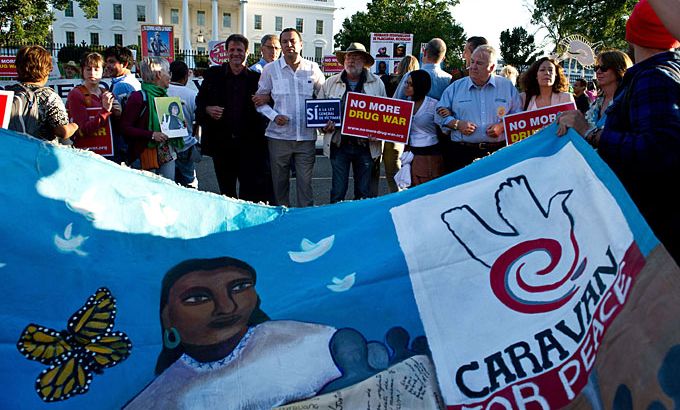
Will the US-Mexico war on drugs ever end?
As a peace caravan highlights the plight of victims we ask if the campaign will achieve policy changes on both sides.
The US capital of Washington DC is the final stop for the Caravan for Peace, a group that has been touring the US for a month for the victims of the so-called war on drugs.
The campaigners have visited more than 25 cities right across the US – from San Diego and Los Angeles in California through the states along the Mexican border, and up through Chicago and New York to Washington DC.
Many of those travelling with the caravan, which journey started in Mexico a year ago, have lost loved one to drug violence.
|
“The systems of control that were established under the guise of fighting the drug war are now being exposed like never before, they are being bilingually, bi-nationally and with a bi-national agenda.” – Roberto Lovato, from Presente.org |
About 90 per cent of drugs entering the US are believed to be controlled by Mexican drug gangs, who have a presence in more than 1,000 US cities.
According to the US Department of Justice, Mexican drug gangs make about $39bn in profits a year, with $6.5bn from exports to the US alone.
The production of one kilogramme of cocaine south of the border is said to fetch $2,000, while the street value in the US for the same amount ranges from $34,000-$120,000.
In 2010, 28,000 people were arrested in Mexico on drug-related charges while 1.64 million people were arrested in the US for drug violations.
The US government spends about $20bn-$25bn a year on counter-narcotics programmes.
But the Caravan for Peace, among other things, says it is the failed policies on both sides of the border that is fuelling the misery.
The six-year policy set by Felipe Calderon, the Mexican president, has produced painful consequences for his country, with some estimates saying the number of deaths now stands at 70,000 people.
|
“One of the main points many [members of the US Congress] said they had not realised was that in many cases these victims are talking about the army and the police being the culprits to the crimes…[and] who are funded heavily by the US [through various sources].” – Laura Carlsen, a specialist on Mexican human rights and security |
Among other things, the campaigners for the Caravan for Peace advocate alternatives to drug prohibition and to halt import of weapons across the US border.
In an interview with Al Jazeera Javier Sicilia, a Mexican poet and leader of the Caravan for Peace, said: “We have achieved a new agenda, a route for peace, one of the first US-Mexican citizen organisations. We achieved a political agenda, shared between countries. We need a process to regain peace… In this war the only ones that are benefitting are the criminals, the corrupt officials, the bankers, the police, the jails, the public does not benefit, who benefits are the promoters of death, the promoters of pain, and it seems like governments prefer this.
“It’s an international theme…the war against drugs is hurting the global population. It’s time to assume that drugs are an assault on the international public health and that weapons are an assault on national security that must be controlled.”
Inside Story Americas asks: Now the Caravan for Peace has completed its journey, how can its aims be realised?
Joining the discussion with presenter Shihab Rattansi are guests: Roberto Lovato, from Presente.org, a group that highlights the political voice of Latino communities in the US; Laura Carlsen, a specialist on Mexican human rights and security from the Center for International Policy (both Lovato and Carlsen joined the caravan for part of its journey); and Sanho Tree, the director of the drug policy project at the Institute for Policy Studies.
|
“Because the drug war and drug prohibition has caused so much harm both in terms of violence and the disproportional impact on communities of colour and poor communities, people are now pushing back in ways that are unprecedented.” Sanho Tree, the director of the drug policy project, the Institute for Policy Studies |
Among the things the Caravan for Peace is calling for:
- Alternatives to drug prohibition including diverse forms of drug regulation and decriminalization
- A halt to illegal smuggling of weapons across the US order into Mexico
- Specific steps to combat money laundering, including holding financial institutions accountable
- Immediate suspension of US assistance to Mexico’s armed forces, and a reorientation of US aid to Mexico to focus on human security and human rights
- An end to the militarisation of the border and the criminalisation of immigrants, and the adoption of policies that protect the dignity of every human being